CQ WEEKLY – COVER STORY
Sept. 15, 2012 – 1:12 p.m.
Politicking Under Cover
By Eliza Newlin Carney, CQ Staff
Some call it “Dark Money.” Others refer to spending by “Stealth Pacs,” or “Super (c)(4)s,” shorthand for a new generation of politically aggressive social welfare groups that are tax-exempt under section 501(c)(4) of the Internal Revenue Code.
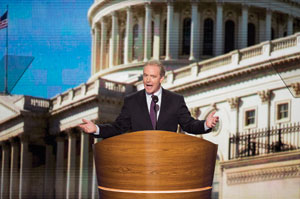
|
||
|
Whatever the moniker, secret money is playing an ever-larger role in the 2012 election. For all the attention lavished on unrestricted super PACs in the wake of the Supreme Court’s 2010 ruling that deregulated most campaign spending, anonymous political donations may reshape elections more dramatically in the long run.
Driving the trend are social welfare groups that ostensibly promote what tax rules call the “common good,” but that appear mostly interested in politics and are spending tens of millions on campaign-style attack ads. Critics say that high-profile 501(c)(4) organizations such as Crossroads GPS, which is run by conservatives, and Priorities USA, which backs President Obama, are exploiting the tax code to obscure their donors. Neither the Internal Revenue Service nor the Federal Election Commission has responded to calls that they intervene.
The trend is bipartisan, but conservatives dominate: They’ve spent 83 percent of the undisclosed money in this election, according to the Center for Responsive Politics (CRP), which tracks campaign finance.
To Democrats and campaign finance watchdog groups, the combination of big money and escalating secrecy spells trouble. Not since the Watergate scandal 40 years ago has unfettered campaign cash flowed so freely under the radar, they warn. On Capitol Hill and on the campaign trail, Democrats have responded with lawsuits, legislation and calls for a regulatory crackdown. Hidden political money, they argue, undermines accountability and invites corruption.
“There’s no trail for prosecutors; there’s no trail for the media; there’s no trail for the public to follow,” says
Republicans, by contrast, are more alarmed by recent moves to pull back the curtain on politically active tax-exempt groups, efforts they warn will stifle free speech. They have repeatedly blocked Whitehouse’s bill, known as the DISCLOSE Act, arguing it would invite donor harassment and intimidation. They have also fought calls for the IRS, FEC, and the Securities and Exchange Commission to impose tighter disclosure rules.
“It looks to me like this administration believes that they can intimidate people into not participating, by the use of a government administration,” says Senate Minority Leader
For better or worse, undisclosed political spending is on the rise. As of Sept. 10, the amount of political money spent by groups that don’t report their funding sources had more than doubled in this election, compared with the same point in the 2010 cycle, according to the CRP. In an election that the organization predicts will cost just under $6 billion, the full tally of political spending that may never be traced to its source could reach into the hundreds of millions.
The biggest spenders so far include conservative group players such as Crossroads GPS, founded by GOP operatives Karl Rove and Ed Gillespie, and Americans for Prosperity, underwritten in part by Charles and David Koch, the billionaire conservative philanthropist brothers who run Koch Industries.
But Democrats have their own non-disclosing allies. Priorities USA Action, the leading super PAC backing Obama, has pocketed $215,234 from its non-disclosing 501(c)(4) affiliate. Other liberal social welfare groups that are spending heavily include the League of Conservation Voters and Planned Parenthood.
“There are thousands of social welfare organizations, and they are organizations that Americans support with their charitable donations every day,” said Sheila Krumholz, executive director of the CRP. “But now there’s a new breed of social welfare organizations that don’t look like their predecessors. They look much more edgy, political and targeted in their activity.”
Politicking Under Cover
Driving Spending Underground
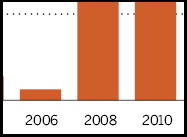
|
||
|
To be sure, the bulk of campaign money remains fully disclosed. Candidates and political parties, which spend the largest share on elections, still publicly report their donors to the FEC. Super PACs may raise and spend as much as they like, as long as they operate independently from candidates. But super PACs, too, must disclose their activities to the FEC.
Despite that, a combination of factors, from newly relaxed rules to emboldened donors to easily manipulated and ill-enforced federal regulations, have pushed political money further underground. Money reaches the shadows via many routes. Some super PACs have concealed donors’ tracks by collecting money from shell corporations, for example. Other super PACs have accepted transfers from affiliated social welfare groups.
The biggest reason for the new anonymity, however, is the rapid growth of politically active 501(c)(4) groups. These have multiplied following the Supreme Court’s 2010 ruling in Citizens United v. FEC that tax-exempt groups of all stripes may spend money more freely in politics.
Nonprofit 501(c)(6) trade associations and 501(c)(5) labor unions also have waded into campaigns more aggressively in the wake of Citizens United, but they have drawn less controversy than social welfare groups. Unions report their activities to the Labor Department; and trade groups’ broad, member-driven agendas insulate them somewhat from charges that they’re purely political.
The vast majority of social welfare organizations, from pacifist to gun rights groups, fulfill the IRS requirement that they “serve the general welfare” through educational and community-oriented activities. The tax exemption dates back to the creation of the federal income tax in 1913.
But in this election a small but growing class of hyper-political 501(c)(4)s is pushing the envelope of tax and election laws. Typically run by political operatives, these “super (c)(4)s,” as University of Miami law professor Frances R. Hill has dubbed them, are often affiliated with candidate-focused super PACs.
“They have pushed the limits of 501(c)(4)s,” Hill says, even of “501(c)(4)s as amplified by Citizens United.”
Outside groups of all political persuasions say they’re following the rules and are simply advocating on issues. They point to the Supreme Court’s landmark civil-rights-era ruling that upheld the NAACP’s right to keep its membership list private.
But candidates, watchdog groups and lawmakers have lodged multiple complaints with the FEC and the IRS. The debate pits corruption concerns against First Amendment rights.
It has also made disclosure, which used to be a point of bipartisan consensus, ground zero in the campaign finance wars. A decade ago, Republican leaders said disclosure was the best way to regulate campaign finance. Now they have reversed course, arguing that disclosure tramples on free speech, and challenging reporting rules on several fronts.
Hide the Money
Politicking Under Cover
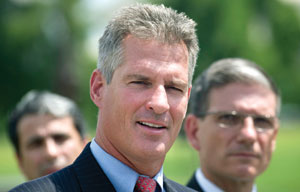
|
||
|
The surge in anonymous spending upends decades of campaign finance law, which is built around public reporting by candidates and parties. It also contradicts the Supreme Court’s own transparency rulings. In Citizens United, the high court threw out limits on independent political spending by corporations and unions but upheld disclosure rules by 8-1.
“The First Amendment protects political speech; and disclosure permits citizens and shareholders to react to the speech of corporate entities in a proper way,” Justice
But the high court’s vision of a fully disclosed campaign finance system has born little resemblance to the messy reality of modern politics. Critics lay the blame on both the FEC and the IRS. The FEC, evenly divided between Republicans and Democrats, frequently deadlocks along party lines and essentially has been unable to act. The IRS is focused on collecting taxes, not penalizing tax-exempt groups, and has historically resisted inserting itself into politically charged tax disputes.
Both agencies have written disclosure regulations that contain gaps and ambiguities, say tax and campaign finance experts. The FEC, for example, requires outside groups running campaign ads independently from candidates to report only donations specifically earmarked for those expenditures.
Maryland Democratic Rep.
IRS regulations, too, have drawn scrutiny in the wake of Citizens United. Social welfare groups, for one, may engage in politics up to a point, but only if it’s not their primary purpose. But IRS regulations do not spell out what primary purpose means, relying on a multipart “facts and circumstances” test, as opposed to a definition built around bright lines.
That has left plenty of wiggle room for social welfare and trade groups to run “issue” ads that promote or assail candidates without calling for their election or defeat, and that, therefore, fall outside the FEC’s disclosure regime.
These unreported “issue” ads have long fueled controversy, lawsuits and watchdog complaints, but since Citizens United they’ve begun rivaling and in some cases even surpassing super PAC ads.
In 2010, non-disclosing social welfare groups outspent fully transparent super PACs by a 3-2 margin — $94.8 million to $65.3 million, according to a joint study by CRP and the Center for Public Integrity. In this election, undisclosed political spending had hit $67.7 million as of Sept. 10, according to CRP — more than twice the level at the same point in the 2008 and 2010 cycles.
In the absence of public reporting, there’s no way to identify who’s paying for the ads, which all seem to feature the same predictably grainy images and ominous sound tracks. But investigative reports in national publications including The New York Times and The New Yorker suggest that some of the same wealthy CEOs backing super PACs, including casino mogul Sheldon Adelson and the Koch brothers, are also underwriting politically active social welfare and trade groups.
Pharmaceutical and insurance industry donors have also transferred large sums to tax-exempt groups, public records show, including $4 million from Aetna Inc. to the U.S. Chamber of Commerce for what a political activity report put out by the insurance giant calls “voter education initiatives.”
“The biggest problem is the loss of accountability,” said Darrell M. West, vice president and director of governance studies at the Brookings Institution. “The messenger matters as much as the message. And right now, we don’t know who is behind particular ads or particular expenditures.”
Politicking Under Cover
The ‘X Factor’
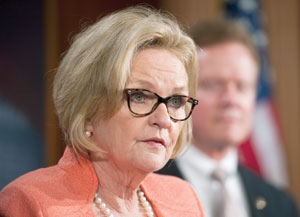
|
||
|
For candidates in the crossfire, undisclosed spending has become what the Sunlight Foundation, which backs increased transparency, calls the “X factor” in this election.
Some candidates, such as Massachusetts Republican Sen.
Six-term Indiana Republican Sen.
Sen.
McCaskill shot back with some ads of her own, attacking the “big oil and insurance companies” who “don’t want you to know who they are.” She’s not the only Democrat who has set out to turn anonymous money into a campaign issue. Obama’s lawyer, Bob Bauer, wrote the FEC in June to complain that Crossroads GPS is running campaign ads “under the pretense of charitable activities” in a bid to “shield its donors.”
Crossroads GPS, which by some estimates is the top non-disclosing outside player, has so far outspent the leading super PAC, Restore Our Future, which backs GOP presidential nominee Mitt Romney. Crossroads GPS has spent $104.7 million on ads targeting candidates, according to a Sunlight Foundation analysis of public records and the group’s own press releases. That’s more than the $82.5 million spent to date by Restore Our Future.
Organizers at Crossroads GPS deny any wrongdoing, and say most of their ads promote policy issues, not campaigns. The group is seeking tax exemption as a social welfare group, but is reportedly still awaiting IRS approval. Crossroads GPS spokesman Jonathan Collegio did not respond to requests for comment. He told National Public Radio that the group’s ads tackle issues such as the deficit and unemployment.
“Those are all issues and advertising that’s protected by the First Amendment, and it would . . . be de facto censorship for the government to stop that type of advocacy from taking place,” Collegio told NPR in July.
And Democrats have their own controversial, big-spending allies, including labor unions. Since unions get their money from dues-paying members and report their activities to the Labor Department, most watchdogs do not count them as non-disclosing groups.
Republicans maintain that the DISCLOSE Act should capture union spending, something Democrats claim it already does. Conservatives maintain that labor unions actually outspend them, pointing to a July Wall Street Journal report that culled Labor Department reports to estimate union political spending in the hundreds of millions.
Labor organizers dispute that report, saying that it lumps advocacy with campaign activity, and double-counts transfers between unions. Transparent or not, unions are spending heavily on the ground and on the air, including a $4 million campaign by the Service Employees International Union and Priorities USA Action to target Romney with Spanish-language ads.
Politicking Under Cover
One union-backed group that has boosted its spending without reporting its donors is a 501(c)(4) social welfare group known as Patriot Majority USA. Run by Democratic organizer Craig Varoga, the group has spent close to $3 million in this election, ranking it among the top five non-disclosing outside groups, CRP data show.
The group recently spent $500,000 on ads as part of a national online campaign targeting the Koch brothers. One spot warns: “Billionaire tycoons Charles and David Koch and their special-interest friends are now spending $400 million to buy this year’s election and advance their agenda.”
Varoga did not respond to requests for an interview, but said in an e-mail: “Our (c)(4) has been recognized by the IRS and has a very well-defined, multi-year, bipartisan primary purpose, which is to work on economic solutions and encourage job creation throughout the United States.”
The Patriot Majority ad targets a non-disclosing GOP group, but Varoga’s group also doesn’t report its donors. Such ironies have prompted conservative organizers to tar the complaints lodged against Crossroads GPS and other GOP-friendly groups as hypocritical and politically motivated. They’ve faulted Democrats, watchdogs and even journalists for failing to disclose fully their own backers.
A Fine Line
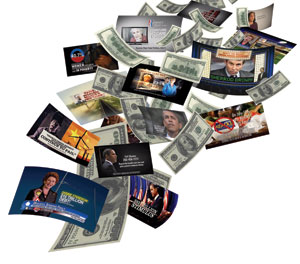
|
||
|
Groups that monitor and critique campaign spending say political players on both sides of the aisle are breaking the rules. Complaints have rolled in to the IRS and the FEC from numerous quarters, including the Democratic Senatorial Campaign and Citizens for Responsibility and Ethics in Washington.
Leading the charge have been Democracy 21 and the Campaign Legal Center, whose organizers have repeatedly complained to the IRS about a handful of groups that they say do not deserve tax-exempt status: Crossroads GPS, Priorities USA and two other social welfare groups — the conservative American Action Network and the nonpartisan group Americans Elect, which sought without success to mount a third-party presidential candidate.
“Each of these groups has one overriding purpose, and that’s to influence elections,” said Democracy 21 President Fred Wertheimer. He added that the groups “are counting on the FEC not enforcing the law, and they are counting on the IRS not enforcing the law.”
Organizers for all four groups say they’re operating within the rules.
Wertheimer contends that, as written, the 501(c)(4) exemption requires such groups to operate “exclusively” for the social welfare. But subsequent IRS regulations and court rulings say only that the groups must be “primarily engaged” in social welfare activities to qualify for tax exemption.
Many political players interpret that to mean that they may spend up to 49 percent of their money on politics. That rule of thumb, however, does not show up in any IRS guidelines. Instead, the agency determines “primary purpose” by looking at a long list of “facts and circumstances,” including the context of ads, their content, and their proximity to an election.
The IRS faces calls from both sides of the aisle to spell out its regulations more clearly. But conservatives, in particular, caution that changes in long-established rules must come from Capitol Hill, not from within the agency. And they aren’t the only ones worried about expanded reporting rules. The American Civil Liberties Union, along with a host of liberal tax-exempt advocacy and social welfare groups, claim donor disclosure could chill their activities.
Politicking Under Cover
“I think when we talk about disclosure, people think it’s no big deal,” said GOP lawyer Dan Backer, a principal attorney with the firm DB Capitol Strategies, who represents several conservative organizations. “But the time and effort that goes into the reporting process is tremendous. And if you make it so burdensome and costly to speak, people are going to not speak. You are creating barriers to entry for political speech.”
For all the disputes over disclosure, the issue is likely to generate little regulatory or legislative change in the near term. Few experts expect the IRS to suddenly swoop into action, given the political sensitivity of the campaign finance debate. The FEC is likewise not expected to step up enforcement. Republicans on Capitol Hill remain unanimously opposed to the DISCLOSE Act.
It will probably take a large-scale political scandal, such as the discovery that foreign contributions found their way into campaigns, to break the logjam, acknowledge campaign reform advocates. Given the amount of anonymous political money now sloshing through the system, however, many say that such a scandal is quickly becoming inevitable.
“I do believe that it’s just a matter of time before we pass the DISCLOSE Act,” says Van Hollen, the legislation’s author in the House. “Obviously, given the current alignment in the House and Senate, it’s difficult. But this is an issue where the public is united. And every public opinion survey shows that Republicans and Independents and Democrats strongly support accountability and transparency.”
Eliza Newlin Carney is a Roll Call staff writer.
FOR FURTHER READING:
Donor transparency, CQ Weekly, p. 1597; deregulated political campaigns, 2011 CQ Weekly, p. 1922; super PAC funding under scrutiny, p. 1184; campaign finance debate, 2010 Almanac, p. 11-35. DISCLOSE Act is